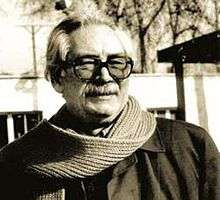Ahmad Mahmoud
Ahmad E'ta (Persian: احمد اعطا), better known by his pen name Ahmad Mahmoud (Persian: احمد محمود); (December 25, 1931 – October 4, 2002) was a prominent Iranian novelist. One of his works, The Neighbors stands out as one of the most notable novels in modern Persian Literature. He was known as a distinguished social realist writer; by his works mainly concerning the lives of working class and lower class families in the urban societies of the South of Iran, especially in Khuzestan. He used to be a member of the Tudeh Party.

Biography
In his youth he worked as a day laborer, driver, construction worker and suffered imprisonment for leftist political views and oppositionist activities. His first story appeared in Omid-e Iran magazine, and in 1959 Mahmoud began publishing collections of stories with Mul (The Paramour).
Other collections followed: Darya Hanuz Aram Ast (The Sea Is Still Calm) 1960, Bihudegi (Uselessness) 1962, Za'eri Zir-e Baran (A Pilgrim In The Rain) 1968, Pesarak-e Boumi (The Little Native Boy) 1971, and Gharibeh'ha (The Strangers) 1972. Modern Persian Short Stories (1980) features a translation of his 1969 story "Az Deltangi" (On Homesickness) from A Pilgrim In The Rain. Hamsayeha (The Neighbors) appeared in 1974 and gave him immediate status as a novelist.
Dastan-e Yek Shahr (Story Of a City) was published in 1981. Zamin-e Sukhteh (The Scorched Earth) was published in the spring of 1982 in a limited 11,000 copies, with a second printing a year later of 22,000 copies. The three novels are a continuing saga set in Khuzistan during three important periods: The days of nationalization of oil in 1951, the aftermath of the coup d'état which brought the Shah back to the throne in late August 1953, and Iraq's invasion of Iran in 1980.
In early 1990s Mahmoud published two collections of short stories: Didar (Visiting) 1990, Qesseh-ye Ashna (Familiar Tale) 1991, Az Mosafer Ta Tabkhal (From Passenger To Cold Sore) 1992, Madare-h Sefr Darejeh (Zero Degree Orbit) 1993, Adam-e Zendeh (The Live Human) 1997, and Derakht-e Anjir-e Ma'abed (The Fig Tree Of The Temples) 2000. Mahmoud's last book won the "golshiri's book prize" and garnered much acclaim. In memory of his brother who died in the Iran-Iraq war, he wrote "the burned ground". Ahmad mahmoud Had a realist style of writing and was essentially a technical author. His book "the neighbours" was banned pre-revolution and is also banned currently post-revolution. Like many other writers in Iran, his potential and abilities was wasted due to the heavy censores and lack of attention and the difficulty and Disrepectful ways that the government treated it's artist and is still treating them today. Mahmoud was also a member of "kanoon-e-nevisandegan-e-iran".
Mahmoud died of respiratory failure in Tehran at the age of 71.
Works
Short story collections
- Mul (The Paramour), 1957
- Darya Hanuz Aram Ast (The Sea Is Still Calm), 1960
- Bihudegi (Uselessness), 1962
- Za'eri Zir-e Baran (A Pilgrim In The Rain), 1967
- Pesarak-e Bumi (The Little Native Boy), 1971
- Gharibeh-ha (The Strangers), 1971
- Didar (Visiting), 1990
- Qesseh-ye Ashna (Familiar Tale), 1991
- Az Mosafer ta Tabkhal (From Passenger To Cold Sore), 1992
Interviews
- "Hekayat-e Hal" ("The Story Of My Condition Now"), a long interview with Ahmad Mahmoud by Ms. Lily Golestan, 1995
Novels
- Hamsayeh-ha (The Neighbors), 1974
Hamsayeha (“The Neighbors”), written in 1963 and published in 1966 by Ahmad Mahmoud, is a work of literary realism. “The Neighbors” is the story of Khaled, a teenager growing up during the period after the Anglo-Soviet invasion of Iran in 1941 until the coup of 1953, one the most important eras in the history of Iran. Set in Ahvaz, a city in southern Iran, 15-year old Khaled lives in a rental house with his mother, sister, and seven other families. After finding a job in a tea house, he experiences his first sexual encounter with Bolour Khanoom, the wife of Aman Aqa, the tea house owner. After breaking the window of a gendarme’s house, Khaled is arrested, and taken to the police station, where a prisoner named Pendar asks him to deliver a message to his partner, Shafiq. While trying to deliver the message, one thing leads to another, and he meets a group of activists trying to unify the Iranian people against Britain colonialism, and to support the nationalization of oil. After trying to escape from a police officer chasing him because he participated in an illegal political meeting, Khaled breaks into a house and meets its resident, Siah-chesh (“Black-eyes”), who he falls immediately in love with. Khaled is later re-arrested because of his increasing political involvement and ensuing entanglements. The rest of the story occurs in prison, ending when Khaled is freed and sent to serve in the military.
- Dastan-e Yek Shahr (Story Of a City), 1981
- Zamin-e Sukhteh (The Scorched Earth), 1982
- Madar-e Sefr Darajeh (The Zero Degree Orbit), 1993
- Adam-e Zendeh (The Live Human), 1997
- Derakht-e Anjir-e Ma'abed (The Fig Tree Of The Temples), 2000
Awards
References
- "The 2001 Golshiri Awards". Golshiri Foundation. Archived from the original on July 3, 2013. Retrieved April 6, 2014.
- Shataw Naseri (5 June 2014). "Houshang Golshiri Awards". The Parsagon Review. Retrieved July 5, 2015.